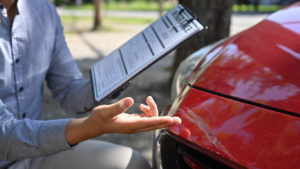
The primary difference between no-fault vs. at-fault insurance is the requirement to prove liability before receiving benefits. Another significant difference is the right to sue the at-fault driver for damages. While Florida is a no-fault insurance state, you could still have the right to sue after a car accident if you sustained serious injuries.
Florida’s No-Fault Car Insurance Requirements
Florida insurance requirements state all drivers purchase $10,000 in no-fault insurance called Personal Injury Protection (PIP). However, no-fault insurance does not apply to motorcycles in Florida. A dozen states are no-fault states, and the rest are either at-fault states or have a mix of the two.
How Does No-Fault Insurance Work After a Florida Car Accident?
PIP policies cover the driver and any occupants in the car. Your no-fault insurance policy also covers a bicyclist or pedestrian you hit with your vehicle.
After a car accident, you file a claim with your PIP insurance provider. PIP policies cover a portion of your loss of income and the cost of medical treatment. No-fault insurance pays up to 80 percent of your medical bills and up to 60% of your lost wages.
You are not required to prove that the other driver caused the accident. Your PIP coverage applies even if you are the person who caused the car crash.
However, there are some drawbacks to no-fault car insurance.
First, you must receive medical care within 14 days of the car crash to be eligible for PIP benefits. Second, the benefits are limited to $2,500 unless you sustain an injury requiring emergency medical treatment. Third, PIP insurance does not compensate you for any other damages, including pain and suffering damages.
Can I Sue a Driver for Damages After a Florida Car Accident?
At-fault insurance or liability insurance compensates an accident victim for damages caused by another driver. Florida insurance laws permit a victim to sue an at-fault driver if the victim sustains a serious injury. Serious injuries include death, significant scarring or disfigurement, and permanent impairment.
Unlike no-fault car insurance, the accident victim has the burden of proving the elements of a negligence claim before they can recover compensation for damages. Proving negligence and liability for an at-fault insurance claim requires evidence establishing the following:
- The other driver owed you a legal duty of care to take reasonable steps to avoid causing a car accident
- The other driver breached the duty of care, such as by failing to obey traffic laws, driving impaired, or traveling at excessive speeds
- The breach of duty was the direct and proximate cause of the traffic accident
- You sustained damages because of the car accident
If you cannot prove the legal elements of a negligence claim, you cannot hold the at-fault driver responsible for your damages. Therefore, the driver’s liability insurance provider is not liable for damages.
What Damages Can I Receive for a Car Accident Claim in Florida?
If you sue the at-fault driver and prove negligence, you are entitled to demand compensation for your financial losses. Economic damages in a car accident case include:
- The cost of medical treatment and rehabilitation
- Loss of income, wages, benefits, and earning capacity
- Out-of-pocket expenses and costs
- Assistance with household chores and personal care
- Long-term nursing care and skilled care
- Modifications to your home and car because of permanent disabilities
Additionally, you can demand compensation for your non-economic damages. These damages cover losses related to the following:
- Emotional distress
- Permanent disabilities and impairments
- Loss of enjoyment of life
- Physical discomfort and pain
- Scarring and disfigurement
- A decrease in quality of life
- Mental anguish and trauma
You can help increase the amount you receive for a car accident settlement by carefully documenting your losses. Keep records of all expenses and payments, including copies of bills, invoices, and records of payments.
It is also a good idea to keep a journal with details of your recovery. It can be difficult to remember how your injuries impacted your life when it is time to negotiate a settlement. The journal can help you provide details to help insurance adjusters and jurors understand how much pain and suffering you endured because of the car accident.
How Can You Protect Your Right to Fair Compensation for a Florida Car Accident?
You can take steps to protect your legal rights after a car accident in Florida. Steps to take after a car accident include:
- Call 911 to report the car accident to the police
- Photograph and video the accident scene
- Collect information from eyewitnesses
- Do not discuss the details of the accident with anyone other than the police officer
- Never admit fault for causing the accident
- Seek immediate medical treatment for your injuries (Delays in medical care can hurt your case.)
- Never agree to a recorded statement or telephone call with an insurance company.
It is also a good idea to talk with a Clearwater personal injury lawyer as soon as possible. Having legal advice before you talk to an insurance adjuster can help you avoid mistakes that could hurt your case.
Schedule a Free Consultation With Our Clearwater Car Accident Lawyers
Florida car insurance laws can be confusing. Collecting a fair settlement for car insurance claims could be difficult.
Contact us at Roman Austin Car Accident and Personal Injury Lawyers to schedule a free consultation with one of our experienced Clearwater car accident attorneys by calling (727) 787-2500, our compassionate team is always standing by to take your call, 24 hours a day, 7 days a week.

